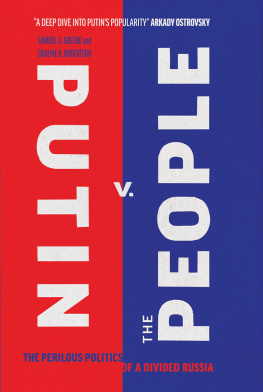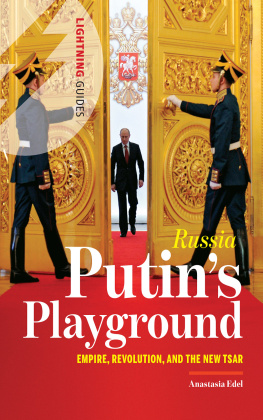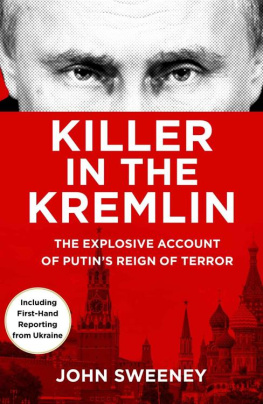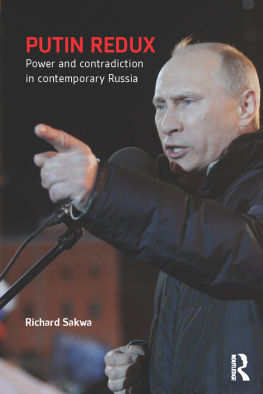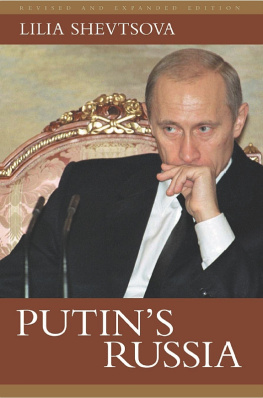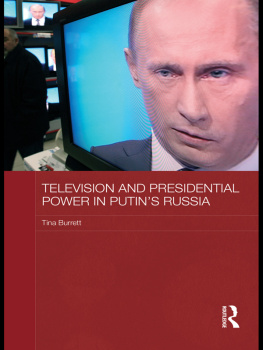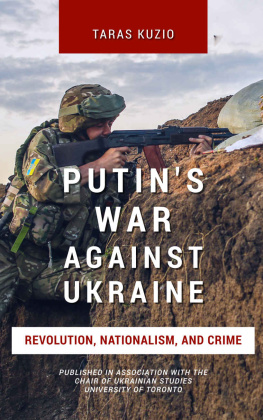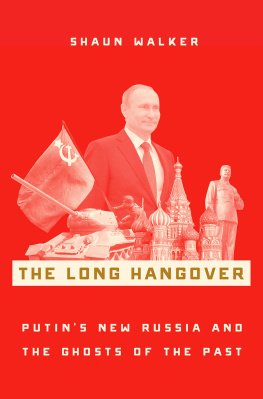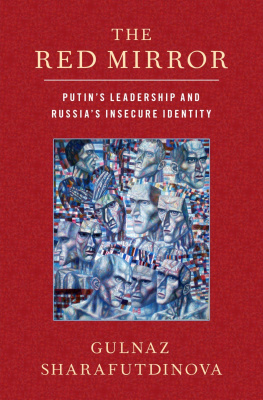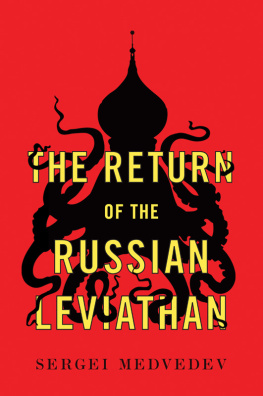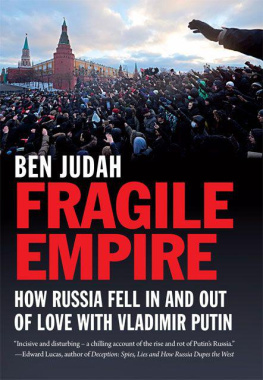PUTIN v . THE PEOPLE

To Elyana and Anya
SG
To Ceci, Toms and Mili
GR
Copyright 2019 Samuel A. Greene and Graeme B. Robertson
All rights reserved. This book may not be reproduced in whole or in part, in any form (beyond that copying permitted by Sections 107 and 108 of the U.S. Copyright Law and except by reviewers for the public press) without written permission from the publishers.
For information about this and other Yale University Press publications, please contact:
U.S. Office:
Europe Office:
Set in Adobe Caslon Pro Regular by IDSUK (DataConnection) Ltd
Printed in Great Britain by TJ International Ltd, Padstow, Cornwall
Library of Congress Control Number: 2019932772
ISBN 978-0-300-23839-6
A catalogue record for this book is available from the British Library.
10 9 8 7 6 5 4 3 2 1
CONTENTS
ACKNOWLEDGMENTS
We are grateful to the many people who have contributed to our thinking on the issues addressed in this book. Though too numerous to list individually, we greatly appreciate the insight and support of all of the colleagues, students and friends who continually challenge and shape our perspectives. We are particularly grateful to a number of people who gave selflessly of their time, reading and commenting in detail on this book as it took shape, including: Charles Clover, Maria Lipman, Cecilia Martinez-Gallardo, Peter McKellar, Silviya Nitsova, Sarah Oates, Roland Oliphant, Roberto Palacios, Gulnaz Sharafutdinova, Marat Shterin, Regina Smyth, Tim Walker, Jonathan Weiler and Ilya Yablokov. We are grateful to the Smith Richardson Foundation for financial support for the surveys on which much of this book is based. Special thanks go to Svetlana Koroleva and Alexei Levinson at the Levada Center, and to Elena Koneva, for helping to make our research possible. And a debt of gratitude is owed to the entire team at Yale University Press, for helping to turn an idea into a book. Much of what works in this volume is down to the generosity and goodwill of all these people and more. Whatever does not work, however, remains the exclusive responsibility of the authors.
ONE
THE PEOPLE AND VLADIMIR PUTIN
Vladimir Putin is a popular man. He is also a dictator. That is not a contradiction.
Putin has been the dominant figure in Russian politics since he first emerged on to the public stage twenty years ago. He has served fourteen years in his current job as president and another four as prime minister. He has survived economic booms and busts. He has led Russia through war and sanctions, through huge street protests and the horrors of terrorism. His power has rarely been challenged. Putins presence has seemed inevitable, a fixed point in a changing world. As other political leaders have come and gone, Putin has remained.
How does he do it?
Being a dictator helps. The president of Russia sits at the top of a huge coercive machine dedicated to policing and controlling. Putin has used the vast power of the Russian states repressive apparatus to intimidate would-be rivals and to expropriate, imprison or exile opponents. Other challengers have been even less fortunate. Some of those who were Putins most vocal critics when we began this research did not survive to press day.
But focusing only on coercion and violence leaves us with an incomplete and misleading picture of Russian politics. Dictators, we generally assume, rule despite the masses, who, given the opportunity, would gladly kick them out of office. Although true in some places, this is hardly the case in Russia. Vladimir Putins rule is not forced on an oppressed and unwilling public, but is jointly builtco-constructedthrough a process of political struggle involving Putin, his opponents and tens of millions of supporters.
In this book, we chart Putins rise from lowly KGB colonel to an extraordinary position in the politics of the country. He is not simply president: he is a rallying point for the nation and a synonym for the Russian state itself. Across the world, journalists and politicians ask themselves, not what will the Russians do, but what will Putin do? In reality, however, it is impossible to answer these questions separately. Putin has been able to rise above the normal push and pull of politics not by force alone, but because he has been lifted up by millions of Russian people. They hold him aloft for a range of reasons, some personal, some material and some emotional. In this book, we explore those reasons, while also seeking to understand those who oppose Putinand those who are indifferent. The result is a story of Russian politics that is quite different from the one you may be used to hearing.
The role of Russian society in building Putins powerwhat we call the co-construction of Russian poweris most often overlooked in the shelves full of books about Putins Russia. But the focus on what Putin has done to Russia is misguided. We need to think not of Putins Russia, but of Russias Putin. We need to understand that Putin is not above the country; he is of the country, of its politics, its society and its history. Instead of focusing on Putin himself, we need to think about Russia and its citizens, asking not only when the ruler might finally loosen his grip, but how and when the ruled might loosen theirs.
NATALYA AND MAXIM
Shortly before Putin was reelected in March 2018 we asked Natalya why she was planning to vote for him.
Time after time in the interview, the 44-year-old receptionist in Yaroslavlan ancient city of about half a million people, some 160 miles northeast of Moscowprefaced her answers by claiming to be uninterested in politics, claiming not to know much, claiming to be a neophyte. You should ask my husband, Natalya would say. He knows about these things. But for all that, her political views were clear enough.
When we spoke, she recalled an incident just a couple of weeks earlier, waiting for an appointment at her local clinic.
This woman was saying to her friend, How come everyone is voting for him? Natalya remembered. The him, of course, was Putin. And he [the friend] answered, Well, he increased their pensions by 30 rubles, and they all vote for him!
Natalya was aghast. To her, this was more than just cynicism: it was ingratitude. Even if theyre complaining about their pensions, they have children who are earning good money, who drive cars, and so on, Natalya explained.
In my view, God forbid the opposition should come to power, she went on. It would be chaos.... Let us continue developing, and let Putin be in power. Were developing. Gradually. And let there be less of all this democracy.
When we interviewed Maxim around the same time, one of the questions we asked him was whether he thought it was important for ordinary Russianslike the ones waiting in line at Natalyas clinicto have the right to criticize those in power. In Russian, the word we used was vlast, most directly translated as power but often used loosely to refer to the authorities. Like many Russians, Maxima 34-year-old product designer for a textile manufacturer in St. Petersburgassociates the concept most closely with the president. And so, when we asked him whether he thought it was appropriate for people to criticize vlast, he was adamant.
No, I think thats wrong, Maxim said. No one should criticize vlast.
Why?
Because, who are we? he asked, rhetorically. We dont have the kind of information that the people in power have. Thats why we elect them, to manage everything.
Russians of all political stripes are fond of a particular adagecoined by the reactionary nineteenth-century French philosopher Joseph de Maistrethat every people gets the government it deserves. When those Russians who would rather not live under Vladimir Putin bring up this quote, they have in mind people like Maxim and Natalya: people who not only support the president, but who seem to do so unquestioningly, as though Putins power were part of the natural order of things and, as such, beyond criticism. For Putin, Maxim and Natalya are in many ways ideal Russian citizens, not simply accepting his policies, but reinforcing his power by treating any criticism of him as illegitimate. By contrast, to many in the opposition Maxim and Natalya are walking caricatures of everything that is wrong with the country. But mockery in this case is misleading. In order to understand how Putins power is built and how it is exercised, we need to know more about who holds these attitudes and why and how their attitudes affect others around them. When we do that, we start to understand the real relationship between the Russian people and their authoritarian state.
Next page
